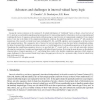75 search results - page 14 / 15 » A Theory of Hierarchical Consequence and Conditionals |
155
click to vote
CORR
2011
Springer
14 years 8 months ago
2011
Springer
Recent research in multi-robot exploration and mapping has focused on sampling environmental fields, which are typically modeled using the Gaussian process (GP). Existing informa...
114
click to vote
ICFP
2004
ACM
16 years 1 months ago
2004
ACM
Useful type inference must be faster than normalization. Otherwise, you could check safety conditions by running the program. We analyze the relationship between bounds on normali...
140
Voted
ATAL
2007
Springer
15 years 7 months ago
2007
Springer
Intelligent agents that are intended to work in dynamic environments must be able to gracefully handle unsuccessful tasks and plans. In addition, such agents should be able to mak...
106
click to vote
FSS
2006
15 years 1 months ago
2006
Among the various extensions to the common [0, 1]-valued truth degrees of "traditional" fuzzy set theory, closed intervals of [0, 1] stand out as a particularly appealin...
135
click to vote
ML
2010
ACM
15 years 3 days ago
2010
ACM
Abstract Clustering Stability methods are a family of widely used model selection techniques for data clustering. Their unifying theme is that an appropriate model should result in...

